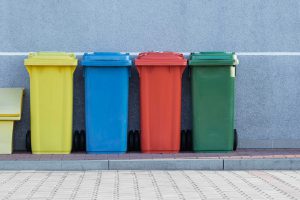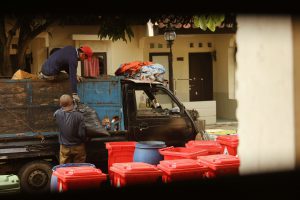 Do you know how to recycle? Well, of course! It’s pretty easy right, just toss items in the bin. If only it were that simple! You are probably guilty of these recycling faux pas, even if you are a relatively conscientious person. Read on to learn more about how you can recycle better!
Do you know how to recycle? Well, of course! It’s pretty easy right, just toss items in the bin. If only it were that simple! You are probably guilty of these recycling faux pas, even if you are a relatively conscientious person. Read on to learn more about how you can recycle better!
I was inspired to write this post while helping clean up after a party. I was throwing away a stack of greasy paper plates and the host said “wait, those go in the recycling!”. I replied that items contaminated with food, especially anything oily should not be recycled. Explanation accepted, I attempted to throw away a large plastic tray. The tray had #5 in the little triangle recycling symbol, not recyclable in our area (only #1 and #2 plastics need apply). The host again instructed me to put the tray in the recycling, explaining “I always just toss it in and let them decide.” This is our first recycling faux pas on the list: “wish-cycling”
1. Wish-cycling
Have you ever tossed something in the recycling bin because you were “pretty sure” it could be recycled? Or what about tossing that pizza box, paper plate, or used  napkin in the bin? It wasn’t that dirty… so, it’s ok, right? Wrong! You, my friend, along with just about all of us, are guilty of wish-cycling. But, why do we do it!? Maybe because thinking something is recyclable makes us feel better about using it once and tossing it. Maybe because we are taught in school to “reduce, reuse, recycle”, so it just seems like the right thing to do. But I promise you, it is not!
napkin in the bin? It wasn’t that dirty… so, it’s ok, right? Wrong! You, my friend, along with just about all of us, are guilty of wish-cycling. But, why do we do it!? Maybe because thinking something is recyclable makes us feel better about using it once and tossing it. Maybe because we are taught in school to “reduce, reuse, recycle”, so it just seems like the right thing to do. But I promise you, it is not!
There are several reasons that wish-cycling is a bad idea, all of them related to making recycling inefficient. As explained in this post by Earth 911, throwing non-recyclable items in the bin creates more work for staff at recycling centers and can cause costly delays. Machines are often clogged with “wish-cycled” items like plastic wrap, garden hoses, and Christmas lights. Worst of all, throwing otherwise recyclable but contaminated items (like greasy pizza boxes and paper plates) in the recycling could actually ruin a huge batch of recycling, undoing a lot of people’s diligent recycling (including yours).
When in doubt, throw it out.
2. Recycling in Plastic Bags
 We’ve all seen it out on the curb or at the recycling center. Piles of recyclables like beverage cans or magazines contained in plastic garbage bags. While containing recycling in plastic bags might be convenient, it actually wastes a lot of time. Recycling employees have to manually rip open and discard plastic bags at the recycling center. Ultimately, plastic bags will not be recycled unless they are taken back to the store of origin, so plastic bags sent to recycling centers just become another waste item. As we all know, time is money. The time that is wasted tearing open plastic bags to release trapped recyclables adds to the cost of recycling and reduces efficiency.
We’ve all seen it out on the curb or at the recycling center. Piles of recyclables like beverage cans or magazines contained in plastic garbage bags. While containing recycling in plastic bags might be convenient, it actually wastes a lot of time. Recycling employees have to manually rip open and discard plastic bags at the recycling center. Ultimately, plastic bags will not be recycled unless they are taken back to the store of origin, so plastic bags sent to recycling centers just become another waste item. As we all know, time is money. The time that is wasted tearing open plastic bags to release trapped recyclables adds to the cost of recycling and reduces efficiency.
Skip the bag! Take your recyclables to the recycling center loose in bins and drop them in designated locations. If you enjoy curbside recycling, simply put the items in and you are done.
3. Confusion with Caps and Lids

Depending on your local communities rules, some caps and lids are recyclable while others are not. The reason for the confusion is that lids and caps tend to be made from materials different from the container. For example, beverage bottles are usually made out of dense plastic while the caps are made from softer plastic. Some recycling programs accept the softer plastic caps but prefer to accept them as separate items, while some programs will not accept the caps at all.
Read your local community rules to find out what you should do with caps and lids before tossing tubs, bottles, and jugs in the bin.
Alachua County recycling: http://www.alachuacounty.us/Depts/SolidWaste/Residential/Curbside/Pages/WhatToRecycle.aspx
Citrus County recycling: https://www.citrusbocc.com/pubworks/swm/recycling/recycling-materials-accepted.pdf
Levy County recycling: http://www.levycounty.org/department/recycling/index.php
Taylor County recycling: http://www.taylorcountygov.com/departments/environmental_services/index.php
Featured image by Daisy Daisy – stock.adobe.com
 1
1
